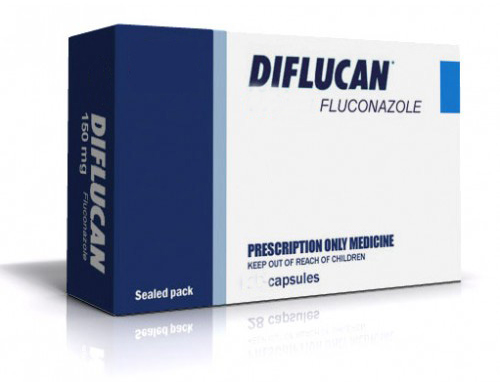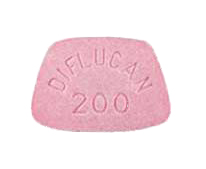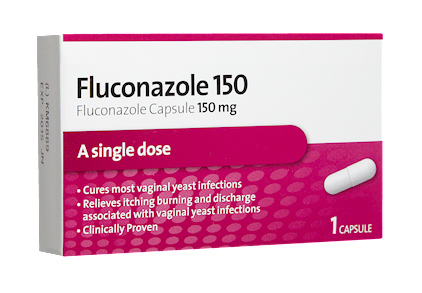

Buy Diflucan!
Fluconazole is sold in the United States under the name Diflucan. In this current study we investigated the effect of Diflucan. Diflucan (fluconazole) is an antifungal medicine. It is used to treat infections caused by fungus, which can invade any part of the body including the mouth, throat, esophagus, lungs, bladder, genital area, and the blood. Diflucan is also used to prevent fungal infection in people who have a weak immune system caused by cancer treatment, bone marrow transplant, or diseases such as AIDS. Diflucan is also used to treat a certain type of meningitis in people with HIV or AIDS.
Take Diflucan for the full prescribed length of time. Your symptoms may improve before the infection is completely cleared. Skipping doses may also increase your risk of further infection that is resistant to antifungal medication.

Can I Buy Diflucan Online?
Looking to save money on a prescription for Diflucan? Find a leading online service for prescription, discounts, which has partnered with most major pharmacies around the country to help you save up to 50 percent off prescription costs. Look for generic version of Diflucan to get the best price at the participating online pharmacy near you.
Diflucan (fluconazole) requires a prescription from a licensed medical provider to be dispensed in the United States. As a result, one cannot just buy Diflucan online. Online pharmacy can connect people who need Diflucan medication with licensed medical providers who can prescribe Diflucan pills if it is appropriate and safe to do so. At some drugstores for buying Fluconazole Without Prescription you need to read medical information about thrush, answer medical questions to check for eligibility. They supplies medicine on prescription and charges a small prescription fee based on the order value of each prescription. Prescriptions are issued by doctors online and sent electronically to pharmacy. If you have your own private paper prescription you need post it to pharmacy.
Dosage
Vaginal candidiasis
The recommended dosage of Diflucan for vaginal candidiasis is 150 mg as a single oral dose.
Since oral absorption is rapid and almost complete, the daily dose of Diflucan (fluconazole) is the same for oral (tablets and suspension) and intravenous administration. In general, a loading dose of twice the daily dose is recommended on the first day of therapy to result in plasma concentrations close to steady-state by the second day of therapy.
The daily dose of Diflucan for the treatment of infections other than vaginal candidiasis should be based on the infecting organism and the patient's response to therapy. Treatment should be continued until clinical parameters or laboratory tests indicate that active fungal infection has subsided. An inadequate period of treatment may lead to recurrence of active infection. Patients with AIDS and cryptococcal meningitis or recurrent oropharyngeal candidiasis usually require maintenance therapy to prevent relapse.

Oropharyngeal candidiasis
The recommended dosage of Diflucan for oropharyngeal candidiasis is 200 mg on the first day, followed by 100 mg once daily. Clinical evidence of oropharyngeal candidiasis generally resolves within several days, but treatment should be continued for at least 2 weeks to decrease the likelihood of relapse.
Esophageal candidiasis
The recommended dosage of Diflucan for esophageal candidiasis is 200 mg on the first day, followed by 100 mg once daily. Doses up to 400 mg/day may be used, based on medical judgment of the patient's response to therapy. Patients with esophageal candidiasis should be treated for a minimum of three weeks and for at least two weeks following resolution of symptoms.
Systemic Candida infections
For systemic Candida infections including candidemia, disseminated candidiasis, and pneumonia, optimal therapeutic dosage and duration of therapy have not been established. In open, noncomparative studies of small numbers of patients, doses of up to 400 mg daily have been used.
Urinary tract infections and peritonitis
For the treatment of Candida urinary tract infections and peritonitis, daily doses of 50 to 200 mg have been used in open, noncomparative studies of small numbers of patients.
Cryptococcal meningitis
The recommended dosage for treatment of acute cryptococcal meningitis is 400 mg on the first day, followed by 200 mg once daily. A dosage of 400 mg once daily may be used, based on medical judgment of the patient's response to therapy. The recommended duration of treatment for initial therapy of cryptococcal meningitis is 10 to 12 weeks after the cerebrospinal fluid becomes culture negative. The recommended dosage of Diflucan for suppression of relapse of cryptococcal meningitis in patients with AIDS is 200 mg once daily.
Prophylaxis in patients undergoing bone marrow transplantation
The recommended Diflucan daily dosage for the prevention of candidiasis in patients undergoing bone marrow transplantation is 400 mg, once daily. Patients who are anticipated to have severe granulocytopenia (less than 500 neutrophils cells/mm) should start Diflucan prophylaxis several days before the anticipated onset of neutropenia, and continue for 7 days after the neutrophil count rises above 1000 cells/mm.
Important Drug Interactions for the Antifungal Drug Diflucan
Patients taking the commonly prescribed antifungal drug fluconazole (Diflucan) should be aware that it has clinically important interactions with many other prescription medications.
Increased risk of fatal heart rhythm abnormalities
Like some other drugs in the azole family of antifungal drugs, fluconazole can cause prolongation of the QT interval. QT prolongation is a change in the electrical activity of the heart that can lead to a fatal heart rhythm disturbance called torsades de pointes, which can cause cardiac arrest and sudden death. During postmarketing surveillance of fluconazole, there have been rare cases of QT prolongation and torsades de pointes in patients using the drug. Patients with low blood potassium levels and severe heart failure are at greatest risk of these adverse effects.
In addition, fluconazole can inhibit substances in the liver called enzymes that metabolize (break down or chemically modify) other drugs, including some that themselves can cause QT prolongation. The product labeling for fluconazole therefore warns that it should never be used together with other drugs that can cause QT prolongation and that are metabolized by liver enzymes inhibited by fluconazole. The list includes certain antibiotics, antidepressants, antipsychotics, drugs for abnormal heart rhythms and other antifungal drugs, among others. Importantly, the liver enzyme inhibiting effects of fluconazole can persist for up to five days after stopping the drug because it takes a long time for the drug to be cleared from the body.
Table 1: Examples of Oral Drugs That Should Never Be Taken with Fluconazole Because of Risk of Fatal Heart Rhythm Abnormalities
| Generic Name | Brand Name(s) | Drug Class |
|---|---|---|
| amiodarone | PACERONE | Abnormal heart rhythm drug |
| aripiprazole | ABILIFY | Antipsychotic |
| citalopram | CELEXA | Antidepressant |
| clarithromycin | BIAXIN XL | Antibiotic |
| clozapine | CLOZARIL, FAZACLO ODT, VERSACLOZ | Antipsychotic drug |
| dronedarone | MULTAQ | Abnormal heart rhythm drug |
| erythromycin | E.E.S., ERY-TAB, ERYC, ERYPED, ERYTHROCIN | Antibiotic |
| escitalopram | LEXAPRO | Antidepressant |
| haloperidol | generic only | Antipsychotic |
| itraconazole | ONMEL, SPORANOX, TOLSURA | Antifungal drug |
| ketoconazole | generic only | Antifungal drug |
| methadone | DOLOPHINE, METHADOSE | Opioid |
| pimozide | ORAP | Tourette syndrome drug |
| quinidine | generic only | Abnormal heart rhythm drug |
| quinine | QUALAQUIN | Antimalaria drug |
| tacrolimus | ASTRAGRAF XL, ENVARSUS XR, PROGRAF | Immunosuppressant/organ transplant drug |
| trazodone | generic only | Antidepressant |
| vardenafil | LEVITRA, STAXYN | Erectile dysfunction drug |
Other important drug interactions
Fluconazole also can inhibit liver enzymes involved in the breakdown of many other drugs. As a result, concomitant (simultaneous) use of fluconazole and these drugs can increase the blood levels of the other drugs, potentially leading to drug toxicity. For example, concomitant use of fluconazole and the anticoagulant (blood thinner) warfarin (Coumadin, Jantoven) can increase blood levels of warfarin. This can increase the risk of bleeding complications. Ideally, concomitant use of these two drugs should be avoided. If such use is unavoidable, more frequent monitoring of warfarin levels should occur during initiation and discontinuation of fluconazole.
Table 2: Examples of Oral Drugs That May Reach Toxic Levels When Taken Concomitantly with Fluconazole
| Generic Name | Brand Name(s) | Drug Class |
|---|---|---|
| amlodipine | KATERZIA, NORVASC | Calcium channel blocker, hypertension drug |
| celecoxib | CELEBREX | Nonsteroidal anti-inflammatory drug |
| cyclosporine | GENGRAF, NEORAL, SANDIMMUNE | Immunosuppressant/organ transplant drug |
| felodipine | generic only | Calcium channel blocker, hypertension drug |
| fentanyl | ABSTRAL, ACTIQ, DURAGESIC, FENTORA, SUBSYS | Opioid |
| glyburide | DIABETA, GLYNASE | Diabetes drug |
| phenytoin | DILANTIN, PHENYTEK | Seizure drug |
| theophylline | ELIXOPHYLLIN, THEO-24, THEOCHRON | Asthma drug |
| tofacitinib | XELJANZ | Immunosuppressant for rheumatoid arthritis, other diseases |
| verapamil | CALAN, VERELAN | Calcium channel blocker, hypertension drug |
| warfarin | COUMADIN, JANTOVEN | Anticoagulant |
If you need treatment with fluconazole, review all your other medications with your doctor to assess for potentially significant drug interactions. Be aware that other drugs not listed in this article also may have dangerous interactions with fluconazole.

FDA approved Diflucan without prescription
Fluconazole was approved by the Food and Drug Administration in 1990 and is used to treat vaginal yeast (Candida) infections; yeast infections of the mouth, throat and esophagus; a type of fungal meningitis; and certain other serious fungal infections. It also is approved for prevention of Candida fungal infections in patients undergoing bone marrow transplantation who receive high-dose chemotherapy or radiation therapy.
Diflucan Synonyms
- Difluconazole
- Fluconazol
- Fluconazole
- Fluconazolum
- Triflucan
Is Diflucan Effective?
Historically, Diflucan has been highly effective against fungal infections. The cure rate for symptomatic Candidiasis following a single 150mg dose exceeds 90%. In recent years, there is a growing concern of resistance to these azole antifungal medications. In humans, Candida species are responsible for the majority of fungal infections. Some Candida species are developing azole resistance which presents a serious problem for medical professionals. Studies have shown that around 5% of Candida species are resistant to fluconazole. This percentage is likely to increase over time, meaning that finding alternative antifungal remedies is a critical area of focus for research studies. Diflucan is an effective treatment for Candida infections, but there are a couple of issues to be aware of. Firstly, prescription antifungals tend to be associated with lots of side effects. And secondly, there is increasing resistance to Diflucan among fungal pathogens.
Benefits
What are the benefits for woman? Diflucan is a tablet you swallow to treat vaginal yeast infections caused by a yeast called Candida. Diflucan helps stop too much yeast from growing in the vagina so the yeast infection goes away. Diflucan is different from other treatments for vaginal yeast infections because it is a tablet taken by mouth. Diflucan is also used for other conditions. However, now we talk about using Diflucan for vaginal yeast infections.

What Is a Vaginal Yeast Infection?
It is normal for a certain amount of yeast to be found in the vagina. Sometimes too much yeast starts to grow in the vagina and this can cause a yeast infection. Vaginal yeast infections are common. About three out of every four adult women will have at least one vaginal yeast infection during their life. Some medicines and medical conditions can increase your chance of getting a yeast infection. If you are pregnant, have diabetes, use birth control pills, or take antibiotics you may get yeast infections more often than other women. Personal hygiene and certain types of clothing may increase your chances of getting a yeast infection. Ask your doctor for tips on what you can do to help prevent vaginal yeast infections.
If you get a vaginal yeast infection, you may have any of the following symptoms: itching; a burning feeling when you urinate; redness; soreness; a thick white vaginal discharge that looks like cottage cheese.
Take Diflucan by mouth with or without food. You can take Diflucan at any time of the day. Diflucan keeps working for several days to treat the infection. Generally the symptoms start to go away after 24 hours. A single dose of 150 mg is the most commonly used dose to treat vaginal yeast infections. It is also used for fungal infections that have spread throughout the body and daily doses up to 800 mg daily may be used for this condition.
How long does fluconazole stay in the body?
Individuals break down medication at different rates. On average, it takes 6 to 9 days for fluconazole to leave your body.
Categories
- Allergy
- Alcohol Addiction
- Anxiety
- Cardiology
- Depression
- Dermatology
- Endocrinology
- Phlebology
- Diabetes
- Herpes Viruses
- Gastroenterology
- General Health
- Gerontology
- Hematology
- Hepatology
- Immunology
- Infectious Diseases
- Men's Health
- Neurology
- Obesity
- Oncology
- Ophthalmology
- Orthopedics & Sports Medicine
- Parasitic Diseases
- Pediatrics
- Psychiatry
- Radiology
- Respiratory
- Rheumatology
- Smoking Cessation
- Urology
- Women's Health